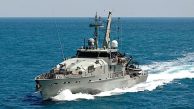
Australia Should Build Its Own Naval Tug Boats to Secure National Interests
Photo: A Damen built tug boat under construction was shown at the company’s Changde shipyard in China last year. (Damen)
A new fleet of tug boats commissioned for use by the Royal Australian Navy has been secretly built at a Chinese shipyard under a $28 million contract awarded last year to a Dutch company. The revelation has prompted serious concerns over national security, sovereign capability, and lost opportunities for Australian industry.
The contract involves the construction of Damen’s Azimuth Stern Drive (ASD) 2111 tug boats, with the first vessels scheduled to arrive in Australia this year. Despite assurances that nearly half of the contract value would be spent in Australia, the primary build was carried out in China, with the fit-out work conducted in Vietnam.
While the vessels are technically designated as civilian-operated support craft and not commissioned Navy warships, their close association with defence operations raises critical questions. These tug boats will provide harbour support and can be crewed by Defence personnel in emergency situations.
The decision to construct these vessels overseas, particularly in a strategic competitor’s shipyard, has triggered widespread concern about potential security vulnerabilities. It has also reignited debate over the lack of transparency in defence procurement and the underutilisation of Australia’s own shipbuilding sector.
No public explanation has been given as to whether Australian shipbuilders were offered a genuine opportunity to bid for the project. This is despite Australia having world-class capabilities and a growing defence industrial base that has proven itself in building naval assets, including the Landing Craft Heavy fleet currently being constructed in Western Australia.
The reliance on foreign supply chains, especially those tied to nations with competing strategic interests, poses long-term risks. It also undermines the development of sovereign defence industry capability, an area of increasing importance amid rising regional tensions and global supply chain disruptions.
Australia must prioritise building such vessels domestically. By investing in local shipyards, the nation can ensure greater control over quality and security, create high-skilled jobs, and foster industrial resilience. The construction of naval support vessels, regardless of whether they are crewed by military or civilian operators, should be part of a broader strategic policy to develop and sustain a sovereign defence manufacturing capability.
As Australia seeks to modernise its maritime assets and assert its strategic autonomy, future procurement decisions must be guided not solely by cost, but by security, capability, and national interest. Tug boats might not carry weapons, but their role in supporting the Navy means they should be built in Australia…by Australians.





Must be Australian built, who decides these issues????